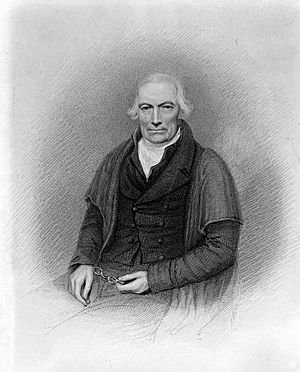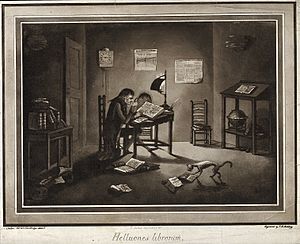Samuel Vince facts for kids
Samuel Vince was an English clergyman, a brilliant mathematician, and an astronomer. He taught at the famous University of Cambridge. He was also a member of the Royal Society, which is a group for top scientists. Samuel Vince lived from 1749 to 1821.
Life of Samuel Vince
Samuel Vince was born in a place called Fressingfield, England. His father was a plasterer, and Samuel worked with him until he was 12 years old. A kind clergyman noticed how smart Samuel was. This clergyman helped Samuel get a better education.
In 1771, Samuel started studying at Caius College, Cambridge. He was a "sizar," which meant he got help with his college costs. In return, he often did small jobs for the college. He was very good at his studies. In 1775, he became the "Senior Wrangler." This was the top math student in his graduating class at Cambridge. He also won the Smith Prize for his excellent work in math and physics.
Later, in 1777, he moved to Sidney Sussex College, Cambridge. He earned his Master of Arts degree in 1778. In 1779, he became a clergyman. Samuel Vince was also one of seven men from his college who joined the Society for Effecting the Abolition of the Slave Trade in 1787. This group worked to end the slave trade.
In 1780, he received the Copley Medal. This is a very important award for scientific achievements. From 1796 until he died, he was the Plumian Professor of Astronomy and Experimental Philosophy at Cambridge. This was a special job where he taught about stars and how things work in science. In 1809, he became the Archdeacon of Bedford, a church leader role. Samuel Vince passed away in Ramsgate.
Samuel Vince's Important Works
As a mathematician, Samuel Vince wrote many books and papers. He wrote about different areas of math, including logarithms and imaginary numbers. Logarithms are a way to make calculations easier. Imaginary numbers are a special type of number used in advanced math.
His writings on how fluids move and resist objects were very important. These works were called Observations on the Theory of the Motion and Resistance of Fluids and Experiments upon the Resistance of Bodies Moving in Fluids. They later helped people understand how to design flying machines, which was key for aviation history.
Vince also wrote a very important set of books called A Complete System of Astronomy. These three books, published between 1797 and 1808, covered everything known about astronomy at the time.
He also published a pamphlet titled The Credibility of Christianity Vindicated. In this work, he defended the Christian religion. He used logical arguments to explain why he believed in miracles, even when others like David Hume questioned them.
 | Emma Amos |
 | Edward Mitchell Bannister |
 | Larry D. Alexander |
 | Ernie Barnes |



